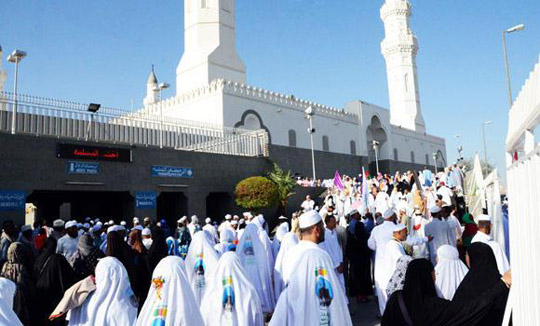
Madinah, Sep 28: Haj convoys left Madinah for Makkah under the supervision of Madinah Gov. Prince Faisal bin Salman after Friday prayers.
Government agencies have stepped up efforts to ensure efficient completion of procedures at arrival and departure points and to ensure that pilgrims are provided with comprehensive services.
More than 700,000 pilgrims have arrived in Madinah, including around 250,000 who were already in the city awaiting departure.
Until early Friday, 430,000 pilgrims had arrived at Prince Mohammad bin Abdulaziz Airport through 1,650 flights. The city has also been receiving hundreds of conveys coming from Jordan and Palestine daily.
The number of pilgrims arriving from Eastern Europe has declined due to ongoing turmoil in Iraq and Syria, previously their main connection points into the Kingdom.
Mohammed Al-Bijawi, head of the region’s Haj Ministry branch, said that the ministry has stepped up efforts at departure and arrival centers, as well as along the Makkah-Madinah highway and all other roads leading to Makkah in order to keep pace with the flow of pilgrims into the Kingdom daily.
He said field teams with qualified personnel have been trained to rapidly complete arrival and departure procedures.
Al-Bijawi said the ministry’s monitoring committees have completed inspection visits to stations, service offices and housing sites to ensure overall performance is on par with this year’s operational plans and directives. He said emergency teams have completed more than 2,000 site tours across gathering points and housing sites for pilgrims to ensure that safety procedures are in place in accordance with Civil Defense directives.
Road security teams have been working around the clock to monitor the movement of pilgrims, with field teams deployed at numerous speed checkpoints to ensure safety, security and assistance.
The General Syndicate of Cars in the region has been welcoming pilgrims at Madinah airport and directly supervising Haj transport companies in Madinah in coordination with local organizations and the local ministry branch.
The General Directorate of Health Affairs, meanwhile, is continuing efforts at providing comprehensive health services across seven hospitals in Madinah, he said.
A total of a 1,000 clinical beds, including 135 beds for intensive care services, are available for pilgrims.
Additionally, 20 health centers have been set up around the Prophet’s Mosque, at housing sites, at entrances and exits in Madinah, and along main roadways to and from the city, as well as air, land and sea ports.
“A health work force of extensive medical, technical and administrative expertise has been trained to provide health and preventative services to pilgrims arriving in the city,” confirmed Al-Bijawi.
Preventive treatment has been provided for 64,038 pilgrims so far.
In addition, 43,611 pilgrims have been administered polio vaccinations.






Comments
Add new comment